Now My Favorite Color is Purple
Sitting down in TPAC’s Polk Theater, the stage is distinctive, all dark, wide, wood planks. There is a slight platform in the center of the stage, and all entrances and exits are made through subtly hidden doors or doorways in the wooden walls. The backdrop is also all wood, the center of which has planks angled to form a simple, upward arrow. This stage sets a mood, indicating an aesthetically pleasing view of rustic Southern mid-20th century poverty. There are no sets in the musical because the stage is enough, and because the story and songs move so fluidly and quickly from one moment to the next that any attempt to have sets keeping up with that would become frenetic.
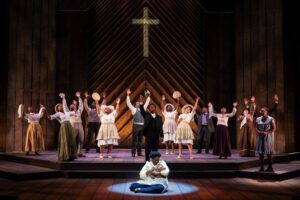
The Nashville Repertory theatre is performing the Broadway adaptation of The Color Purple, which is based both on the book and its film adaptation. I have neither read the book nor seen the movie (or the 2023 film adaptation of the musical), so my judgment of the story is based on this presentation, which I found to be excellent. The book is epistolary, which makes for great reading but presents a challenge when changing formats. The adaptation very rightly doesn’t try to force the play into that format. Some letters are exchanged, but there is no narrator or awkward plot framing: lighting is used simply and cleverly, beaming down when characters need to be separated or connected with others.
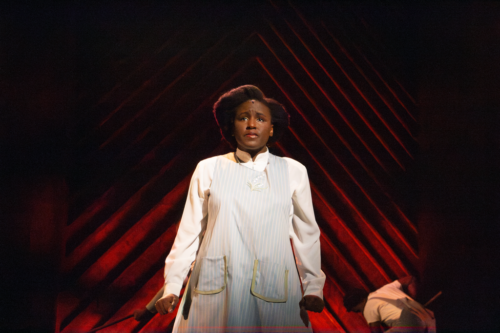
The story seems very bleak and unpleasant when written down summarily: Celie lives a hard life, abused by men and stuck in a situation that she thinks she can never escape. We meet her as a pregnant 14 year old African American girl living in a poor rural area in Georgia. After giving birth to her second child, her Pa gets rid of it in the same mysterious fashion he did with her other baby. She’s soon married off to Mister, an older local farmer who wants a wife to watch his kids and house, despite his irritation at her bad looks; he’d much prefer her younger sister. Her sister Nettie tries to come stay with them because Pa is making advances on her, but when Mister hits on her she runs off, promising to write to Celie every week. Time passes. Celie meets and admires two very different, independent women: Sofia, who marries Harpo (Celie’s stepson), and Shug Avery, the singer who is always accompanied by scandal. She learns what it is to develop strength in what seem to be impossible situations.
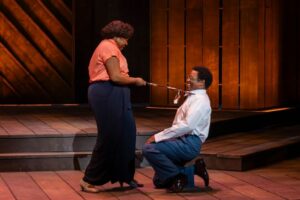
This all sounds like a character-building but difficult watch. Two things prevent that from being the case: first, the presentation of the abuse and hardship is so cleverly balanced. We’re not forced to watch extended scenes of physical abuse, like in Tina- The Tina Turner Musical. Instead most of the abuse is mentioned casually, as a matter of fact, making it invisible and yet all the more impactful: when Celie gives birth to what we find out is her second child, she gives it up to her Pa. Nettie asks why she gave the baby up and Celie answers simply, “Well, it’s his baby.” Ouch. Second, the musical is so very funny. Celie rarely is snide or cracks a joke, but most of the women, especially Sofia, are hilarious. Their wit and refusal to let men control them (despite the men’s best efforts) is entertaining to us and inspiring to Celie. There is no monotony of suffering.
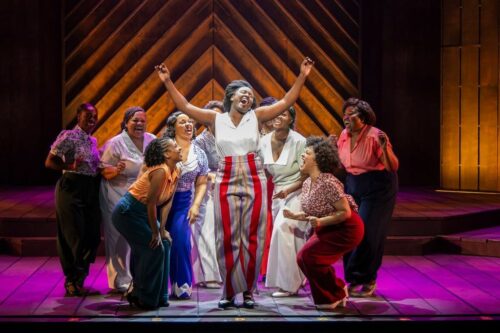
The only weakness in The Color Purple is its attempt to deal with theodicy. Celie, living her hard life, justly asks why a good God would let these things happen to her. This vital question is blurred, conflated with the discovery of self-worth, and answered by a non sequitur: God is inside her and in everyone else. This isn’t an actual answer to the question of why bad things happen to good people. The problem of evil remains: if God is in her stepfather, why would he still sexually assault her? However, the development of Celie’s character from abused child to a strong, independent woman, her growth through sisterhood, is an unequivocally inspiring story. And although it is fiction, it authentically represents the women who often go unmentioned: American history is full of African American women who have been handed an unfair, hard life, and who, through strength and community, have made the world a better place.
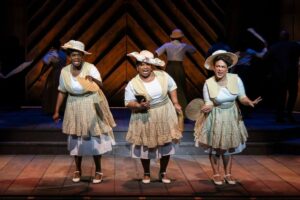
The music is great and has multiple styles: blues, soul, and gospel. The genre best suited to Broadway adaptation is probably gospel, because it requires vocal virtuosity and talented choirs. The Nashville Repertory does the music very well, with a strong band and fantastic singers. Most of the music is upbeat and fun, with the majority of the ballads in the second act. My favorite part of the music is the Greek chorus, three gossiping church ladies who talk over each other rhythmically and have marvelous harmonies.
Such a show requires real talent from every member of the team, and the Nashville Repertory Theatre provides it. The leads’ singing is virtuosic, the ensemble numbers are energetic. Joi Ware’s choreography is fun and matches the quality of the music. The cast is strong. Celie is played by Carli Hardon, who is absolutely lovely in the role. She plays child Celie with a natural youthfulness and her development from beaten-down woman to independent woman with a bedrock of strength is captivating. Her longing for the children she was forced to give up is moving. My favorite character in the play is Sofia, the healthy-minded, independent woman to whom Celie looks up as an ideal. Shinnerrie Jackson plays her with such good comic timing, with such hearty humor, and a fantastic voice. Tamica Nicole is Shug Avery, the sexy and scandalous singer who is another ideal and a love interest, voicing her role impressively. The men in the play are mainly abusive, but they aren’t one-dimensional. Elliott Winston Robinson plays Mister, and his portrayal of this unlikable man is nuanced. Gerold Oliver is Harpo, his son, who is a better man than his father, but who mistakenly wants to emulate him. His attempts at mimicking his father’s behavior is tragic and very funny, and his mixture of vice and virtue, of response to the generations of men in his family, develops naturally. The gossiping Greek chorus is played by Lindsey Kaye Pace, Yolanda Treece, and Meggan Utech, and they have incredibly tight harmony.
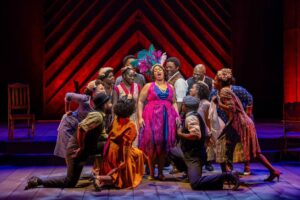
Nia Safarr Banks’s costumes and Joonhee Park’s scenic design are perfect for the musical, and Dalton Hamilton’s lighting is spot on. The band, led by music director Dion Treece, is great. Director Reggie Law has made sure the show is tight and impactful.
The Color Purple is a good show, whether you want something to provoke you to think, to examine African-American history, or you just want to watch a talented group perform an entertaining musical; it’s all of these things.
The Nashville Repertory Theatre will be performing The Color Purple at TPAC’s Polk Theater until April 14th. You can find more information at The Color Purple | TPAC and The Color Purple — Nashville Repertory Theatre.



